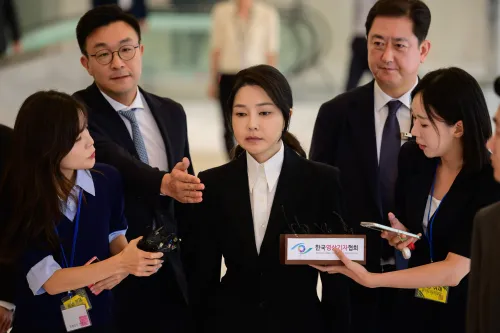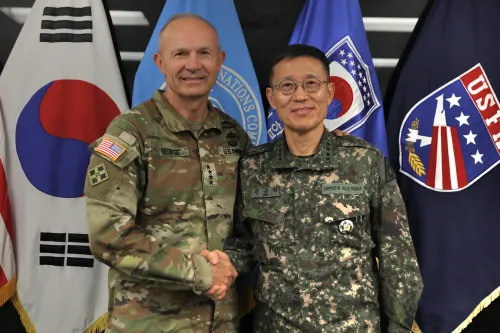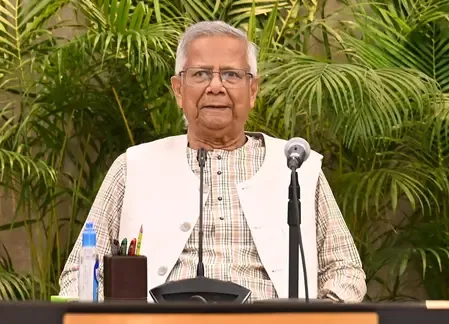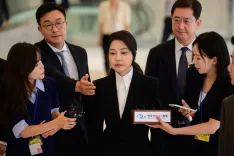Have South Korea, US, and Japan Strengthened Their Denuclearisation Stance on North Korea?
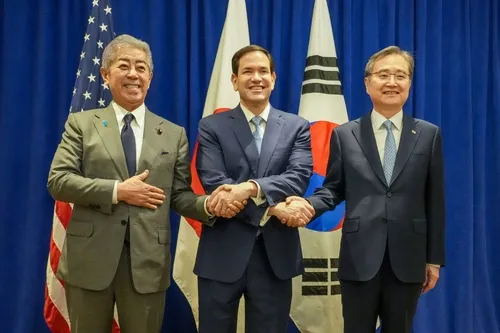
Synopsis
Key Takeaways
- Commitment to denuclearisation reaffirmed by South Korea, US, and Japan.
- North Korea's leader suggests dialogue if US drops demands.
- Continued focus on sanctions against DPRK's nuclear programs.
- Concerns raised over China's maritime claims and actions in Taiwan.
- Trilateral cooperation emphasized in economic security and cyber defense.
Seoul, Sep 23 (NationPress) The senior diplomats from South Korea, the United States, and Japan have reiterated their unwavering commitment to the denuclearisation of North Korea, according to a joint statement released on Tuesday. This reaffirmation comes after the North's leader called on Washington to abandon that objective as a prerequisite for resuming dialogue with Pyongyang.
The statement was issued following a meeting between Foreign Minister Cho Hyun, US Secretary of State Marco Rubio, and Japanese Foreign Minister Takeshi Iwaya, who convened on the sidelines of the UN General Assembly in New York on Monday to discuss their collaboration and other mutual concerns, including the nuclear threats posed by North Korea.
This declaration followed North Korean leader Kim Jong-un suggesting he would consider engaging in discussions with US President Donald Trump's administration provided that Washington retracts its denuclearisation demands, asserting that he has no plans to give up his nuclear arsenal.
"The Secretary and Foreign Ministers reaffirmed their unwavering commitment to the denuclearisation of the Democratic People's Republic of Korea (DPRK) in line with the relevant United Nations Security Council (UNSC) resolutions, while continuing efforts to maintain peace and stability on the Korean Peninsula through dialogue and diplomacy," the statement indicated, referring to North Korea by its official designation.
"They highlighted the importance of jointly addressing the DPRK's nuclear and missile programs and emphasized the need to uphold and enhance the sanctions regime against the DPRK by firmly responding in collaboration with other nations to any violations and evasions of the pertinent UNSC resolutions."
In a parliamentary address, Kim cautioned that it would be a miscalculation to assume that North Korea could be coerced or subdued through sanctions or displays of military strength.
During the talks in New York, Cho urged for active cooperation from Washington and Tokyo to revive dialogue with Pyongyang and to make significant headway towards peace on the Korean Peninsula and the resolution of nuclear issues, as reported by the foreign ministry in a separate press statement.
In the joint statement, the US reaffirmed its extended deterrence commitments to its two Asian allies, deemed critical for the security and stability of the Korean Peninsula and the broader Indo-Pacific region.
They "reaffirmed their determination to enhance defense and deterrence through robust security cooperation, including regular trilateral multidomain exercises such as 'Freedom Edge,' and to bolster their respective defense capabilities," the statement elaborated.
The statement also indicated a united stance against China's assertiveness, expressing opposition to "unlawful maritime claims in the South China Sea," a region fraught with disputes involving Beijing and neighboring nations like the Philippines.
Also highlighted was the Taiwan Strait, where the three parties expressed concern over the increasing frequency of destabilizing activities surrounding Taiwan.
They "encouraged the peaceful resolution of cross-Strait issues and opposed any attempts to unilaterally alter the status quo."
Additionally, they reiterated serious apprehensions regarding North Korea's growing military cooperation with Russia, especially Moscow's assistance in enhancing Pyongyang's military capabilities, particularly its long-range missile systems.
They expressed concern over North Korea's malicious cyber operations involving its IT workforce and emphasized the necessity for deeper trilateral collaboration to combat such activities, as reported by the Yonhap news agency.
The three nations also reaffirmed their commitment to advancing trilateral cooperation in economic security areas, including supply chain resilience, digital infrastructure, and artificial intelligence.
In relation to the recent mass detention of South Korean workers in Georgia, Cho accentuated the need for a new visa system and urged Washington to take appropriate actions to prevent such incidents from recurring.
"Secretary Rubio acknowledged that although it is a bilateral matter, the US will collaborate closely with South Korea for a prompt resolution in light of the alliance," the ministry stated in the release.

